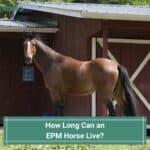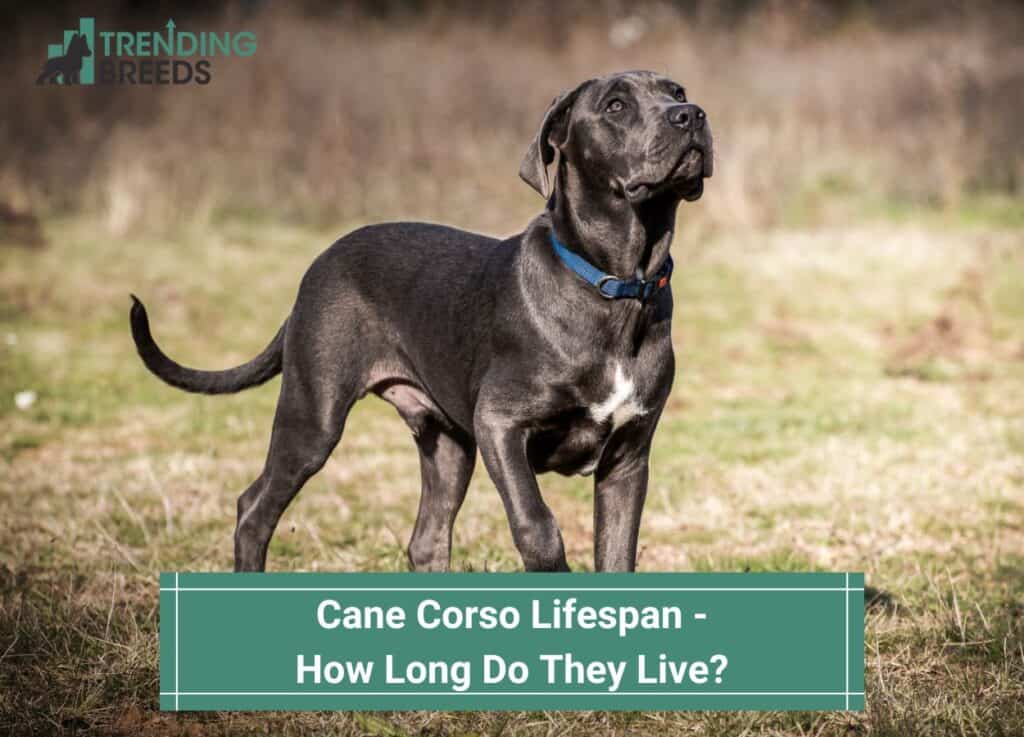
Cane Corsos are intelligent and easy to train. But what makes them stand out is their innate need to defend and please their owners.
The life expectancy of bigger dog breeds, like with the Cane Corso, is typically lower than that of smaller dog breeds.
That’s because bigger breeds tend to age more quickly and experience health problems earlier in life. Keep reading the article if you have been asking about Cane Corso lifespan.
Other articles you would like: Is Your Cane Corso Too Skinny? and Cane Corso Vs Pitbull
Table of Contents
How Long Does a Cane Corso Live?
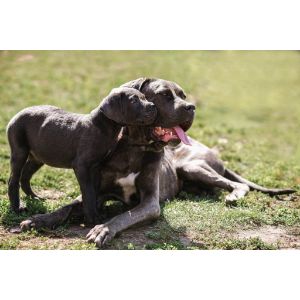
Cane Corsos, like most other large-sized dog breeds, live for 10 to 12 years on average. Nevertheless, if you give your Cane Corso a healthy diet and lots of exercise, they may live longer than the breed’s typical lifetime.
A dog’s lifespan is reliant on a variety of factors such as:
- Lifestyle
- Food
- Level of training
- Access to adequate veterinary care
A Cane Corso’s diet and nutritional intake is the essential component that can significantly impact the dog’s overall lifetime.
Therefore, you must feed your Cane Corso with a balanced diet consisting of high-quality dog meals.
That might help them to maintain their health and spend more years with you. Considering all of these factors, it is only logical to conclude that the life expectancies of different Cane Corsos will vary.
How To Increase Your Cane Corsos Lifespan
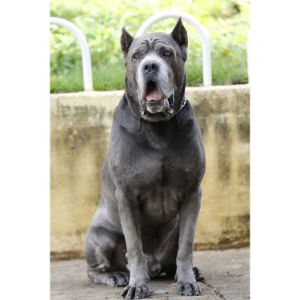
Even though it is well-established that larger dog breeds tend to have a far shorter life expectancy than smaller ones, that doesn’t mean you can’t give your pet a long one.
You may help your Cane Corso reach his full potential by setting ideal surroundings for a healthy lifestyle.
Here is how you can achieve that:
Ensure Your Dog Eats a Balanced Diet
Ensure that your Cane Corso is getting healthy, high-quality food. Commercially made food is available, but pick your products wisely.
If you want to feed your dog commercial foods, you should choose the one that’s not only protein-rich but also lists protein as the primary ingredient.
The foods should also contain fiber for easy digestion and healthy fats. If you choose to cook Cane Corso meals at home, there are a few things you’ll need to consider.
Remember that Cane Corsos, being huge breed dogs, need a diet high in protein. Fiber-rich carbohydrates are fine, but only in moderation. You might also consider feeding your dog raw and moist food.
However, wet food has some drawbacks in that it doesn’t assist in your dog’s teeth cleaning. You might not give this a lot of weight, but poor canine dental care has been connected to various other health problems.
It would be best to consider your dog’s age when selecting how much food to give him, as the nutritional needs of a young or middle-aged Cane Corso differ from those of an older dog. Your dog needs access to clean water at all times, so provide it for him.
Exercise & Training
Your dog needs vigorous exercise at least twice a day. You may consider hiring a dog walker if you have a tight schedule. Cane Corsos have a lean build but a muscular appearance, and they like exercising alongside their human companions.
They must engage in activities that help them keep their muscle tone.
Your dog will enjoy more than just brisk strolls and sprints. You can go with him on bike rides and long hikes.
They are willing to learn and please you, so take advantage of it by giving them quality training. Cane Corsos are smart dogs that respond positively to training.
When you train your dogs and give them activities to perform, you’re helping with mental stimulation. They can also flaunt their sports prowess by engaging in physical exercise.
Routine Vet Visits
Taking your Cane Corso for frequent checkups is essential in ensuring their health. You will improve your chances of detecting any health problems early on before they worsen and become unmanageable.
When you take your Cane Corso to the vet, you can also get sound advice from them on providing the best possible care for your pet. Your veterinarian can advise you on the ideal age to undertake various treatments, including neutering and spaying.
Develop a Genuine Bond
Emotional well-being also affects your dog’s quality of life. Ensure that you have adequate time to spend with your dog. It only takes a little effort to make him happy, like playing a fetch game with your puppy.
Dogs that have strong bonds with their owners tend to live longer. When they’re in distress, they can turn to their human companions for comfort to help ease their suffering.
Put Away Harmful Items
Another thing that owners should keep in mind is the importance of exercising caution when it comes to storing harmful substances.
When selecting toys for your Cane Corso, it is essential to ensure that the toys don’t carry a choking threat. For safety reasons, opt for bigger toys.
You should also store detergents and other potentially hazardous liquids safely. You can restrict your dog’s space access by training or setting up barriers.
Prevalent Health Issues of Cane Corsos

Cane Corsos can be vulnerable to certain hereditary conditions and diseases. It would help if you had an understanding of those health risks because they have the potential to reduce the Cane Corso’s lifespan.
Gastric Torsion
The condition affects the stomach in two different ways. The first manifestation of this condition is stomach bloating, which occurs when the stomach becomes filled with a combination of fluids, froths, and gasses.
The other symptom is torsion. It results from bloating and twisting of the stomach. They can happen simultaneously or separately.
Hip Dysplasia
Hip dysplasia is the most frequent cause of medical concern, regardless of how big or small your dog is. A dog is likely to experience this disorder more than twice in its lifetime. The disorder may show its symptoms as early as five months of age.
The disorder’s most noticeable signs are the soreness and immobility of the back legs. Fortunately, anti-inflammatory drugs and corticosteroids make treatment easier.
In extreme cases, a vet may administer anti-inflammatory injections. Furthermore, surgery might be an option if medical management fails to alleviate symptoms.
Skin Allergies
There is a high incidence of skin allergies in Cane Corsos, with approximately one in four victims, which might result in pyoderma. In the future, your dog may develop a variety of skin problems.
They frequently suffer from skin conditions such as Skin Fold Dermatitis, Chin folliculitis, and Elbow Hygroma.
Ectropion
It’s one of the eye conditions widespread in Cane Corsos, mainly affecting a dog’s eyelid. Your dog’s lower eyelid becomes excessively droopy or rolls outward. It might impact a single eyelid or both at once.
The condition is typically more likely to affect dogs with loose skin, which includes your Cane Corso, who is also prone to it.
How Different Factors Affect the Life Expectancy of a Cane Corso
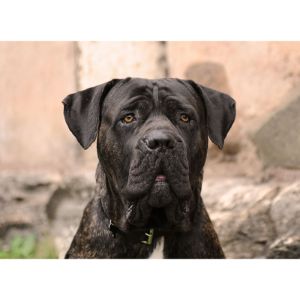
Here are factors that affect the life expectancy for a Cane Corso.
Diet
The Cane Corso’s diet is among the factors that have the potential to make the dog live longer. The healthiest options for your Cane Corso are those you prepare at home.
It might be meat, veggies, or a combination of the two. Nevertheless, whether or not your dog enjoys a meat-and-vegetables diet highly depends on the individual dog. Consider consulting veterinary nutritionists to know the right diet for your Cane Corso.
Training
If you feel you won’t be able to devote a significant amount of time to a Cane Corso’s training, you should rethink your choice of getting one. That’s due to the breed’s reputation for being dominant and strong.
If people deem your dog a danger to the neighborhood, he may be killed. Furthermore, your Cane Corso is at risk from local predators if you’ve not given him adequate training to recognize danger. That’s particularly true if you use him as a farm dog.
Body Size
The size of a dog is a crucial factor to consider, especially in Cane Corso. It is common knowledge that smaller breeds have a higher life expectancy than bigger ones. The average lifespan of one dog is significantly longer than the other.
Since they mature and age more rapidly than smaller dog breeds, bigger dogs typically have shorter lifespans. Due to their fast maturation rate, they often develop cancer and other degenerative diseases earlier than their peers.
Genetics
A dog’s lineage is essential information responsible breeders should record and maintain.
If you are concerned about your new dog’s health, you may always inquire about the parents. The puppy’s health records must show that it’s free of genetic conditions.
Puppy farms lack these records, and many puppies you’ll encounter are sickly and have a low life expectancy. The medical history of a puppy’s parents can reveal whether or not the puppy has an increased risk of developing common diseases like cancer.
Overall Health
No dog is immune to illnesses or other health complications. Inevitably, there will come a time when your pet will experience some difficulty.
Nevertheless, you can prevent him from aging prematurely with regular checkups and timely medication administration. To extend your dog’s life, it’s essential to identify any health problem symptoms as early as possible.
Regular Exercise
Cane Corsos’ lifespan mostly depends on their physical activity. If you exercise your Cane Corso regularly, he will have a longer and healthier life since his muscles and bones will be in fine shape.
The puppy will have a lower risk of developing diabetes, osteoporosis, and other dog illnesses. A dog is more likely to gain weight without regular exercise, which can shorten its life expectancy.
For people, being overweight significantly shortens one’s life expectancy, maybe by as much as three years. The same thing may happen to dogs whose owners don’t monitor their weight regularly.
A Cane Corso who’s a few pounds over their ideal weight is at a higher risk of developing a variety of ailments, including respiratory issues.
Conclusion For “Cane Corso Lifespan – How Long Do They Live?”
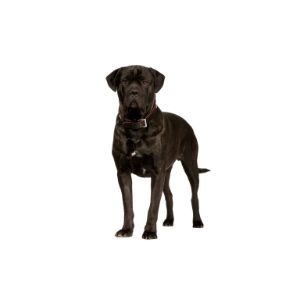
The Cane Corso is a brilliant and trainable dog breed. They have a fearless disposition and welcome new challenges with open arms. Your Cane Corso will reward your dedication to training with affection.
A Cane Corso life expectancy is between 10 and 12 years. However, everything is contingent upon you as his owner. What you feed your puppy and the training you give him will hugely impact Cane Corso lifespan.
We hope the article helped answer all your questions about a Cane Corso lifespan.
You will also like:
- Belgian Malinois Cane Corso Mix Guide
- Cane Corso In The Snow – Can They Handle Cold Weather?
- Does A Cane Corso Shed?
For more information about the Cane Corso Lifespan, check out the video below:




